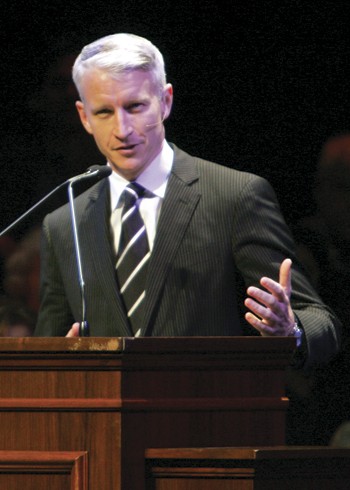
CNN news achnor Anderson Cooper delivers the Jones Day Lecture of the Tate Lecture Series last night in McFarlin Auditorium.
Anderson Cooper gave advice to young journalists and discussed current events at the Jones Day Lecture of the Tate Lecture Series.
Cooper said he had no idea of what he wanted to do when he graduated with a liberal arts degree from Yale. When he asked his mom, Gloria Vanderbilt, for advice, she told him to “follow your bliss.”
At the time, Cooper thought the advice was too vague, but now he appreciates what she told him.
After winding his way through jobs at Channel One and ABC News, Cooper was hired at CNN. He currently hosts “Anderson Cooper 360.”
Cooper said his show differs from other cable programs because he tries to present both sides of the story. He said almost anyone could get a cable show now if they are opinionated enough.
“I’m not like most anchors…I don’t like to hear myself speak, unlike most, like Lou Dobbs,” Cooper said.
He said the cable networks should stop trying to appeal to people’s partisanship and instead focus on the facts.
“It seems we’re encouraged to see things through our own views,” Cooper said.
Cooper, along with NBC’s Brian Williams, has become associated with coverage of Hurricane Katrina.
Cooper said he tries to keep the story in the public consciousness by hosting his show from New Orleans periodically.
More than a year later, he says, the Lower Ninth Ward is “like a time capsule of incompetence.”
Cooper discussed the saga of trying to get New Orleans Mayor Ray Nagin to sit down for an interview. Nagin continued canceling on Cooper until one night when CNN found out Nagin was in a bar after telling the network he couldn’t go on air due to an emergency meeting.
After that incident Nagin finally sat down, but Cooper said the interview wound up not working out.
“I thought I got a good interview, but when I sat down to log it, it turned out I had nothing,” Cooper said.
The situation in Iraq took up the rest of Cooper’s time, with him saying each time he goes back the scene on the ground gets worse.
“Iraq is the hardest story to tell right now because it’s difficult to travel and get around,” he said.
Cooper said planes that land at the Baghdad airport must land in a corkscrew formation, in which the planes get in the airspace and make tight circles down until they land.
When Cooper gets off the plane he said he is taken to a private compound outside the green zone that CNN owns. The network pays for its own guards who are former British special forces members.
Reporting is difficult, Cooper said, because getting to talk to real people is nearly impossible.
“If you are in a neighborhood for more than 15 minutes, the insurgents find out and word spreads and you have to get out,” he said.
Earlier in the day, Cooper spoke before one of the largest crowds in Student Forum history. Six hundred students were in the Hughes-Trigg Ballroom and nearly 500 were in the Hughes-Trigg Theater watching a simulcast.
The final Tate Lecture of the fall semester is during final exams on Tuesday, Dec. 5. Malcolm Gladwell of The New Yorker will be speaking.








